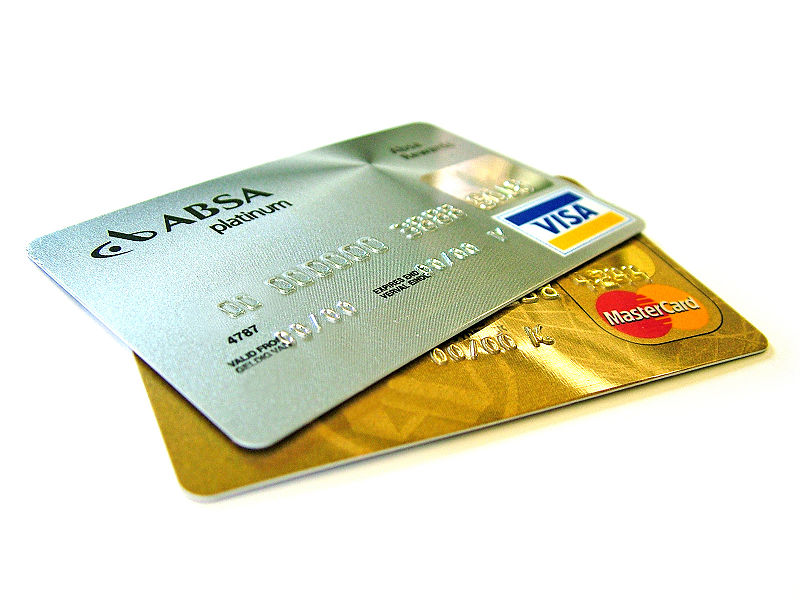Buenas tardes, estimados alumnos.
Comenzamos una serie de ejercicios dedicados a revisar los puntos principales del programa del curso.
Hoy toca: Money and consumerism.
Nota: Los textos están seleccionados tanto del programa CREA como de otras fuentes, a quienes doy las gracias y cito, pero todos tienen el nivel del curso.
Texto nº 1
THE CREDIT CARD KID
Walter Cavanagh owns 1,497 active credit cards valued at $1.7 million. Aside from holding the world record for the most number of credit cards, he also owns the world's longest wallet, measuring 250 feet in length and 38 pounds in weight, with a capacity to hold 800 cards. Dubbed "Mr. Plastic Fantastic" by the Guinness Book of World Records, Walter has been listed in the book annually since 1971. Cavanagh has been tracking directories of US businesses to send as many credit card applications as he can.
 Imagen en Wikimedia Commons |
His fascination with credit cards all started in the later 1960s when he and his pharmacist colleague in California vied to collect the most credit cards to win a bet, the price of which was a fancy dinner. Cavanagh, who was fresh from Peace Corps at that time, was able to collect 143 cards by year end, defeating his friend who just collected 138. This feat earned him his first Guinness Book title.
He used to apply for one or two cards a week. There was even a time when he applied for 300 cards in just one month. He sometimes unknowingly applied for a card he already owned. When his application was declined, he would send a letter to the issuer explaining his purpose for seeking credit card approval, which is to maintain his world title. All of his credit card applications were accepted except one for J.J. Newberry. His application was denied in the early 1970s by the company when a large number of cards had been already amassed by Cavanagh. Four decades later, Cavanagh still doesn't own a Newberry credit card.
The retired financial planner used to take his collection with him wherever he traveled. One got him into trouble when it set off a metal detector in a Texan airport. His briefcase was inspected by the guards and hundreds more were found. The culprit was the sterling silver credit card issued by the defunct Mapes Hotel, the first casino hotel in Reno. The card, a collector's item, grants unlimited credit privileges, said Cavanagh.
 |
His credit cards were issued by various establishments such as ice cream stores, airlines, bars and gas stations. His cheapest credit card has a maximum credit of $50. From green cards to gold cards, Cavanagh has the most diverse collection of credit cards. His cards come from every state in the Union and some even come from foreign countries like Canada, the UK, Germany, Norway and Mexico.
All of his 1,497 cards are valid. But Cavanagh only uses one of them and keeps the rest in a safe-deposit box. The majority of his cards have never been used or signed by him. He pays his due on time, which gives him an almost perfect credit score.
"Never use a card to buy anything you can't pay off in a couple of months", he says. " If you don't have the discipline, you shouldn't have the cards"
Texto nº 2:
Saving time by Shopping Online
With the rise of the internet is it unsurprising that retailers have jumped on the opportunity to offer goods online whenever they can. Reaching a far wider group of people, clever online campaigns can be used by retailers to advertise their goods as much as possible. While retailers benefit, shopping online also offers you and me, the consumers on the street a huge range of benefits as well.
One of the best reasons to shop online is the ability to save time. Modern lives are considered to have become very busy, with work and leisure activities quickly taking over all the hours of the day. While some lucky guys may love nothing more than to hit the high street and shop, others simply don't have the time as they are too busy with their families or with work. This is where online shopping is becoming increasingly important as valuable time which can be put to better use elsewhere may be saved.
A major benefit is that no travel time is needed if you want to shop online. While an entire morning may need to be set aside for grocery shopping, browsing the internet before buying goods can be done in an instant. It can be done within the comfort of your own home, meaning that it can be done at any time of day whenever you get a spare moment. Search options are also assumed to reduce shopping time significantly. Whereas in a shop you have to browse through items, in an online store you can instantly look for what you need and want. Prices are often cheaper too, with online retailers not having to pay large overhead expenses for brick-and-mortar shops and many retailers such as M and M, direct discount vouchers can be found. And with search options often offering categories, pricing ranges, sizes, or quantities, life can be made much quicker and easier
Over the past few years food shopping online has become particularly popular, with a range of both high street and online retailers offering delivery services. This is expected to be a brilliant way of saving time as not only can you get your items delivered, but many websites provide online baskets which will remember the foods bought previously. A weekly shop can then be done by simply reordering a standard basket, taking only a few minutes of your valuable time.
Online clothes' shopping can also save a huge amount of time, and while you may believe that the returns procedure is complicated, many stores have taken steps to make it as easy as possible. Valuable time can be saved by utilising search facilities available on websites, allowing you to search for garments by size, colour, prices, or even brand. A number of websites style guides are also offered, a great benefit if you find a top you like but are not sure of a suitable pair of trousers for example. Meanwhile, by shopping at online outlets such as M and M, direct discount codes can be found and the returns process is often free and as easy as simply filling out a small coded sheet and popping items into the post. And for anyone who is pushed for time and would rather spend valuable moments enjoying their family and hobbies, online shopping is considered to be a fantastic time saving opportunity.
 |
| https://www.caracteristicas.co/publicidad/ |
Texto nº 3:
ADVERTISING
As the economy expanded during the 19th century, advertising grew alongside. In the United States, the success of this advertising format eventually led to the growth of mail-order advertising. In 2010, spending on advertising was estimated at $142.5 billion in the United States and $467 billion worldwide.
In June 1836, the French newspaper La Presse was the first to include paid advertising in its pages, allowing it to lower its price and extend its readership.The formula was soon copied by all titles. Around 1840, Volney B. Palmer established the roots of the modern day advertising agency in Philadelphia. In 1842 Palmer had large amounts of space traded in various newspapers at a discounted rate then resold the space at higher rates to advertisers. The actual ad - the copy, layout, and artwork - was still prepared by the company wishing to advertise; in effect, Palmer was a space broker. By 1900 the advertising agency had become the focal point of creative planning, and advertising was firmly established as a profession.
At the turn of the century, there were few career choices for women in business; however, advertising was one of the few available. Since women were responsible for most of the purchasing done in their household, advertisers and agencies recognized the value of women's insight during the creative process. In fact, the first American advertising to use a sexual sell was created by a woman - for a soap product. Although tame by today's standards the advertisement featured a couple with the message "The skin you love to touch".
Modern advertising was created with the innovative techniques used in tobacco advertising beginning in the 1920s, most significantly with the campaigns of Edward Bernays, who is often considered as the founder of modern Madison Avenue advertising.
Advertising has gone through five major stages of development: domestic, export, international, multi-national, and global. For global advertisers, there are four, potentially competing, business objectives that must be balanced when developing worldwide advertising: building a brand while speaking with one voice, developing economies of scale in the creative process, maximising local effectiveness of ads, and increasing the company's speed of implementation. Commercial advertisers often seek to increase consumption of their products or services through "branding", which involves the repetition of an image or product name in an effort to associate certain qualities with the brand in the minds of global consumers.If they have their image broadcast on TV, the radio, in the press, it helps it to stick in consumers' minds.
While advertising can be seen as necessary for economic growth, it is not without social costs. Unsolicited commercial e-mail and other forms of spam have become so prevalent as to have become a major nuisance to users of these services. Advertising is increasingly invading public spaces, such as schools, which some critics argue is a form of exploiting children . In addition, advertising frequently uses psychological pressure (for example, appealing to feelings of inadequacy) on the intended consumer, which may be harmful. Many even feel that, often, advertisements exploit the desires of a consumer, by making a particular product more appealing, or by manipulating the consumers' needs and wants.
Saludos y nos veremos la próxima semana, Dios mediante.
No hay comentarios:
Publicar un comentario